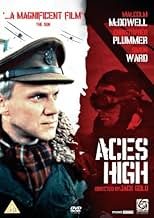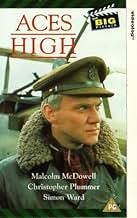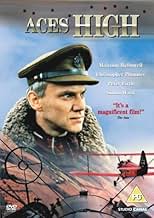IMDb-BEWERTUNG
6,5/10
3200
IHRE BEWERTUNG
Im Ersten Weltkrieg stellt die hohe Unfallrate unter den Nachwuchspiloten des Royal Flying Corps eine enorme Belastung für die Überlebenden dar.Im Ersten Weltkrieg stellt die hohe Unfallrate unter den Nachwuchspiloten des Royal Flying Corps eine enorme Belastung für die Überlebenden dar.Im Ersten Weltkrieg stellt die hohe Unfallrate unter den Nachwuchspiloten des Royal Flying Corps eine enorme Belastung für die Überlebenden dar.
- Nominiert für 1 BAFTA Award
- 1 Gewinn & 2 Nominierungen insgesamt
Gilles Béhat
- Beckenauer
- (as Gilles Behat)
Handlung
WUSSTEST DU SCHON:
- WissenswertesMany of the actors playing pilots in this film were in their early thirties, however in reality most of the Royal Flying Corps pilots were aged 18-25. Only the 21-year-old Peter Firth was the right age.
- PatzerBecause of the use of disguised, more modern, inauthentic aircraft, most (with the exception of the mocked-up SE5s with their forward-facing radiators hiding the V8) are shown with radial, instead of, rotary engines, where the engine block rotates around a fixed crankshaft.
- Zitate
Mess Corporal Bennett: [as the pilots set off early in the morning on a dangerous mission] How many for breakfast? Any of them?
- Crazy CreditsOpening credits prologue: England October 1916
- Alternative VersionenSome DVD releases feature a shorter print which reduces the French restaurant scene and misses out shots of the officers looking at a slideshow of nude photographs. These appear to have been made by the distributor, as the film has never been cut by the BBFC.
- VerbindungenEdited into Blackadder - Vierter Teil: Private Plane (1989)
- SoundtracksUnder the Bridges of Paris
(Sous les Ponts de Paris)
(uncredited)
Music by Vincent Scotto
French lyrics by Jean Rodor
English lyrics by Dorcas Cochran
Ausgewählte Rezension
Written from the English point of view, this film seems to have it's tongue in it's cheek at times, but it's not at all funny. There are several flashes of humor in the early scenes, at the expense of the British upper class, but those quickly give way to the special horrors of the first war fought in the air.
Patriotic young pilots straight out of college lost their lives in literally a few days time, due to their inexperience and the stress of this new kind of battle. Malcolm McDowell has the unwelcome task of leading the 76th Squadron and also visiting colleges to drum up recruits, all the while knowing he's inviting them to an almost certain death. He keeps these new recruits at arms length to soften the blow to his mental health when they invariably get shot down. When he shows up at his own alma mater, an idealistic young man, played by Peter Firth, signs up for McDowell's squadron. On his arrival at the airfield, Firth sees the evidence of the turnover in pilots but fails to see the connection to his own longevity; a family photo and personal effects are whisked out of the room he's been assigned, right in front of his eyes. He is introduced to Simon Ward, a stony-faced pilot who by the end of the movie is finally driven insane by the awful, daily anticipation of his own death in battle.
The young pilots experience the respect that their station in the Air Corps elicits from the locals and from women, but at the same time they see how they are more likely to be killed than the average filthy foot soldier. Firth is taken with a local cabaret girl, who invites him to her room one night. The next night, when he expects her to be glad to see him, she ignores him and pays attention to an older, richer officer. The very next day the pilots are given the task of destroying German spotter balloons, which always have heavy gun and air protection, and the older pilots know this is almost a death warrant. Six planes go out, with McDowell and Firth in two of them, but you'll have to watch the film to find out how many come back.
A very good, but depressing, film, McDowell is subdued in his performance and seems to come out of his cocoon only at the end. This is necessary, I think, for his character to survive in the surroundings of constant tragedy. Firth is naive in the extreme, and this probably a correct portrayal of a green recruit in WWI, where there was no frame of reference for how dangerous those early airplanes were. The film shows us just how little the commanders valued the lives of their men by sending them out unprepared and inexperienced, and that they know after one group of fliers is decimated, there is always a fresh batch of innocent boys to take their place. I recommend the film highly, since it has a firm anti-war message.
Patriotic young pilots straight out of college lost their lives in literally a few days time, due to their inexperience and the stress of this new kind of battle. Malcolm McDowell has the unwelcome task of leading the 76th Squadron and also visiting colleges to drum up recruits, all the while knowing he's inviting them to an almost certain death. He keeps these new recruits at arms length to soften the blow to his mental health when they invariably get shot down. When he shows up at his own alma mater, an idealistic young man, played by Peter Firth, signs up for McDowell's squadron. On his arrival at the airfield, Firth sees the evidence of the turnover in pilots but fails to see the connection to his own longevity; a family photo and personal effects are whisked out of the room he's been assigned, right in front of his eyes. He is introduced to Simon Ward, a stony-faced pilot who by the end of the movie is finally driven insane by the awful, daily anticipation of his own death in battle.
The young pilots experience the respect that their station in the Air Corps elicits from the locals and from women, but at the same time they see how they are more likely to be killed than the average filthy foot soldier. Firth is taken with a local cabaret girl, who invites him to her room one night. The next night, when he expects her to be glad to see him, she ignores him and pays attention to an older, richer officer. The very next day the pilots are given the task of destroying German spotter balloons, which always have heavy gun and air protection, and the older pilots know this is almost a death warrant. Six planes go out, with McDowell and Firth in two of them, but you'll have to watch the film to find out how many come back.
A very good, but depressing, film, McDowell is subdued in his performance and seems to come out of his cocoon only at the end. This is necessary, I think, for his character to survive in the surroundings of constant tragedy. Firth is naive in the extreme, and this probably a correct portrayal of a green recruit in WWI, where there was no frame of reference for how dangerous those early airplanes were. The film shows us just how little the commanders valued the lives of their men by sending them out unprepared and inexperienced, and that they know after one group of fliers is decimated, there is always a fresh batch of innocent boys to take their place. I recommend the film highly, since it has a firm anti-war message.
Top-Auswahl
Melde dich zum Bewerten an und greife auf die Watchlist für personalisierte Empfehlungen zu.
- How long is Aces High?Powered by Alexa
Details
- Erscheinungsdatum
- Herkunftsländer
- Sprachen
- Auch bekannt als
- Aces High
- Drehorte
- Produktionsfirmen
- Weitere beteiligte Unternehmen bei IMDbPro anzeigen
Box Office
- Budget
- 1.250.000 £ (geschätzt)
Zu dieser Seite beitragen
Bearbeitung vorschlagen oder fehlenden Inhalt hinzufügen

Oberste Lücke
By what name was Schlacht in den Wolken (1976) officially released in India in English?
Antwort

































